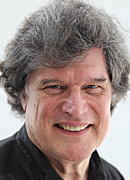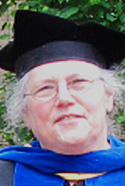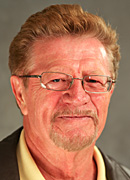David Becker’s “fans” said their goodbye May 26 by way of an extended standing ovation after Lawrence University’s director of orchestral studies conducted the Lawrence Symphony Orchestra in concert for the final time.
The college says its farewell to the talented maestro Sunday, June 10 at its 163rd commencement in the form of an honorary degree.
Becker, along with Associate Professor of Chemistry Mary Blackwell and Professor of German Hans Ternes — and their collective 78 years of teaching experience — will be recognized as retiring faculty with professor emeritus status and presented honorary master of arts degrees, ad eundem, as part of the graduation ceremonies that begin at 10:30 a.m. on the Main Hall green. Blackwell and Ternes will be honored in absentia.

Becker spent 11 years conducting the Lawrence Symphony Orchestra in two separate stints — early in his career (1976-80) and late, returning in 2005 after 21 years as director of orchestras and professor of the graduate orchestral conducting program at the University of Wisconsin-Madison.
He credits distinguished faculty colleagues, outstanding students and a supportive administration for luring him back to Lawrence.
“I believe in the quality and integrity of this institution and I sincerely have been proud to be part of it for a second time around,” said Becker, who was recognized with Lawrence’s Award for Excellence in Teaching at the college’s 2010 commencement.
Like all exceptional teachers, Becker left a profound imprint on his students.
“Professor Becker has been the core of my Lawrence experience for the past five years,” said graduating senior Louis Steptoe, a violinist in the orchestra. “I have known him to be a man of surpassing integrity, respect, empathy and a true and tireless servant of the orchestra. Over the years I have seen his teaching continue to adapt, yet his commitment to his students and their professional education has never wavered.”
A “gift to Lawrence”
Fred Sturm ’73, director of jazz studies, hailed Becker as “a rare combination of true gentleman, loyal friend, committed colleague, inspirational mentor and world class musician.”
“The performances and projects I’ve shared with him stand among my most cherished Lawrence memories,” said Sturm. “Dave’s a giant — in both physical stature and artistry — and he’s been a great gift to Lawrence.”
Fellow conductor Andy Mast, who directs the Lawrence Wind Ensemble and Symphonic Band, said Becker’s “professional excellence, pedagogical mastery and personal graciousness have made Lawrence University a better place to teach and make music.”
While he may be retiring from Lawrence, his baton won’t be collecting dust anytime soon. His immediate future includes a bevy of guest conducting gigs, among them the Madison Symphony Orchestra, the NAfME All-National Honors Orchestra at the Kennedy Center in Washington, D.C., the University of Wisconsin music clinic honors orchestra, as well as all-state honors orchestras in South Carolina and New York.
A ChemLinks Coalition Pioneer

Blackwell came to Lawrence in 1989 with a strong background in physical and biophysical chemistry, having previously worked for the U.S. Department of Agriculture at the University of Illinois and as U.S. National Institutes of Health Fellow at London’s Imperial College.
One of the immediate impacts upon her arrival was a significant step up in research activity, supported in part by several grants she received for important new instruments.
“Mary provided productive research opportunities for a number of our best students, several of whom have gone on to productive careers of their own,” said professor emeritus of chemistry Jerrold Lokensgard, a colleague of Blackwell’s her entire Lawrence career. “Over the years, Mary has contributed in important ways to the development of the chemistry curriculum, especially in our introductory courses and in physical chemistry. In at least half her years here, she has taught the course through which our best-prepared students have entered the chemistry curriculum.”
Blackwell was an original member of the ChemLinks Coalition team, a $2.7 million multi-institutional initiative funded by the National Science Foundation. The program sought to revolutionize the teaching of chemistry by creating modules that featured student-centered active and collaborative classroom activities and inquiry-based laboratory and media projects, rather than traditional lectures.
Her impact extended beyond the chemistry department through her involvement in the development of one of Lawrence’s earliest environmental studies courses and most recently, she developed and introduced a very well-received introductory course focused on chemistry and art.
She was recognized with Lawrence’s Freshman Studies Teaching Award for 2000-01, which cited her for “the excitement, enthusiasm and intellectual curiosity” she brings to the course.
Weaving Language with Music
Ternes, who traces his roots to a family of refugees from a German-speaking enclave in Romania, taught German at Lawrence for 44 years. His scholarly interests extended to languages other than German, including Italian, Portuguese and Spanish, as well as the literature and culture of the ethnic German communities that were under stress in the post-World War II era, leading to a course entitled “The History of the Romance Languages.”

He also was involved with the Lawrence men’s soccer program for several years, serving as the team’s head coach for four seasons in the mid-1980s and guiding the Vikings to their first Midwest Conference championship in 1985.
“What I treasure most of all was the freedom and the opportunity Lawrence offered me to explore some of my interests and talents,” said Ternes.
He says he takes particular pride in his work and cooperation with music majors who also happened to be German majors.
“I guided many honors and senior projects on topics relating to German literature and music and had the pleasure to perform some popular music pieces with voice and instrument majors,” said Ternes, who organized a number of Liederabend (Evening of Song) during his tenure. “I’m also proud of our majors who have become teachers and professors of German themselves.”
Long-time department colleague Dorrit Friedlander, professor emerita of German, said Ternes “was particularly well suited for Lawrence because of his enthusiasm for German and music. He was well known for weaving the two disciplines together.”
Denise Haight of Oconomowoc, a 1970 Lawrence graduate, remembers Ternes as “cerebral, proficient and passionate about his area of expertise.”
“He struck fear in the heart of this student in that he demanded unwavering dedication and scholarship,” said Haight. “However, he was consistently nurturing of his students’ abilities.”
One of Ternes’ most popular courses, as well as a personal favorite, was his “Comparative Fairy Tales” class, which was invariably oversubscribed to by students.
“I think I succeeded in turning many Lawrence students into enthusiastic story tellers,” said Ternes. “Judging from the reactions of students, this course has had the most lasting influence upon them.”
About Lawrence University
Founded in 1847, Lawrence University uniquely integrates a college of liberal arts and sciences with a world-class conservatory of music, both devoted exclusively to undergraduate education. Ranked among America’s best colleges by Forbes, it was selected for inclusion in the book “Colleges That Change Lives: 40 Schools That Will Change the Way You Think About College.” Individualized learning, the development of multiple interests and community engagement are central to the Lawrence experience. Lawrence draws its 1,445 students from 44 states and 35 countries. Follow us on Facebook.